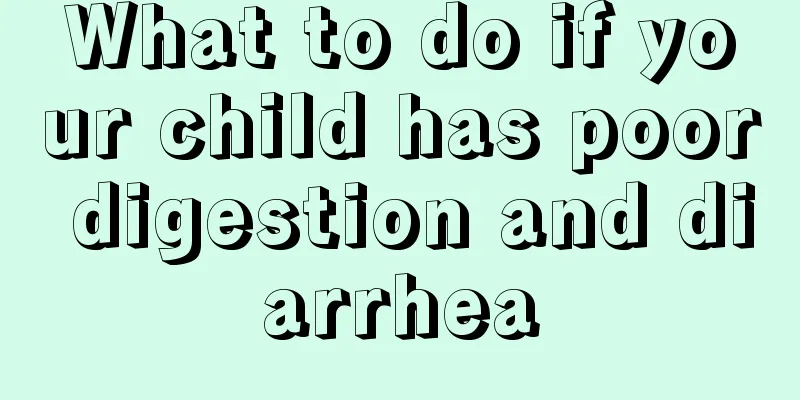What to do if your child has poor digestion and diarrhea

|
Children's resistance is relatively low, so they often have some minor problems. Because their gastrointestinal function is not yet fully developed, many children usually have poor digestion. Therefore, as parents, we must pay attention to children's diet problems. When children are relatively young, it is best not to feed them some meat, as this will easily cause symptoms of indigestion. So what should we do if children have diarrhea due to poor digestion? 1. Adjust your diet: ⑴ Mild or non-infectious diarrhea (generally no fever or other symptoms of infection and poisoning, no mucus, pus or blood in the stool, no obvious abnormality in laboratory tests, or only a small amount of fat globules) should reduce the amount of milk fed and extend the interval between feedings, and suspend or reduce complementary feeding. Artificial feeding can temporarily give diluted milk, rice soup and other easily digestible foods, and then gradually increase the amount of milk. ⑵ When severe diarrhea requires infusion, fasting for 6-12 hours or longer. After vomiting and diarrhea are cured, you can gradually resume your diet from less to more, from thinner to thicker. It takes 3-4 days for mild cases, and 5-10 days for severe vomiting and diarrhea to resume a normal diet. ⒉ Strengthen care: Pay attention to the nature of vomiting and diarrhea and record the frequency and amount as well as urination time and urine volume. Change diapers frequently, wash buttocks frequently, and prevent urinary tract infection and diaper dermatitis. ⒊ Control infection: Use antibiotics according to the situation of intestinal infection, mainly to control Escherichia coli. The current medications include co-trimoxazole (children's tablets), 1-2 tablets each morning and evening for children aged 2-6 years old (double the dose for the first dose), 2-4 tablets each morning and evening for children aged 6-12 years old, or berberine 5-10 mg/kg, taken orally in 2 doses. Neomycin, furazolidone, pipemidic acid, etc. can also be used. If the poisoning symptoms are severe, ampicillin and gentamicin can be injected intramuscularly. If the medication is ineffective after 2-3 days, you can replace or add another drug. For Staphylococcus aureus infection, you can use new penicillin II or erythromycin. For viral infection, you can use malopaque, the Chinese medicines Isatis indigotica and Isatis root. For fungal infection, you can use nystatin, clotrimazole, and extraintestinal infectious diarrhea, and corresponding treatment for extraintestinal infection. 4. Symptomatic treatment: ⑴ For those who cannot stop vomiting after fasting, phenobarbital sodium can be used, 5-7 mg per kilogram of body weight each time, intramuscular injection. Chlorpromazine, vitamin B@6, and Emor can also be used. ⑵ Antidiarrheal agents should not be used in the early stages of diarrhea. If the symptoms have improved but the diarrhea persists, drugs such as tannic acid protein, bismuth subcarbonate or aluminum hydroxide can be used. You can also take 1-3 ml of egg yolk oil 3 times a day. ⑶ In case of abdominal distension, hot compresses can be applied to the abdomen and anal gas can be passed, and lactase can be taken orally or neostigmine can be injected intramuscularly. Severe abdominal distension in the late stage of diarrhea is mostly caused by hypokalemia and potassium should be supplemented immediately. ⑷ Loss of appetite: you can use pepsin, pancreatic enzymes, multi-enzyme tablets and other medicines. The above is some introduction on what to do if children have diarrhea due to poor digestion. In fact, the most important thing is to pay attention to their daily diet and give them more foods that help digestion. When children have diarrhea, it is necessary to prevent diarrhea and dehydration in time. If there is no improvement for a long time, you must seek medical attention in time, because long-term diarrhea is relatively harmful to children. |
<<: What to do if your child has poor digestion and vomits
>>: What to eat for children with gastroenteritis
Recommend
What should I do if my six-month-old baby has less sleep?
Children in their early childhood not only need a...
Analysis of the relationship between urticaria and allergens in children
Urticaria in children develops very quickly. Basi...
Why do babies keep crying?
It is a common phenomenon for babies to cry, but ...
What is the treatment for oral ulcers?
Many babies will experience thrush, which is also...
Treatment of red pimples on children's body
Nowadays, it is not uncommon for children to have...
What should we pay attention to in children's bone development?
Children should not be neglected during the criti...
What can my baby eat to get better quickly when his runny nose comes out?
Children have relatively weak resistance and are ...
What to do if a 10-year-old child has a hunchback?
The bones of many children have not yet fully dev...
What is the cause of vulvitis in young girls?
Many parents believe that girls do not need to pa...
What are the methods for children to keep healthy in autumn?
Children themselves do not understand their own p...
What should I do if my child has swollen lymph nodes?
Lymph nodes are very important nodes in the circu...
Why is the child's voice hoarse?
Many parents now report that their children have ...
Mental retardation can be cured
The intelligence of a child, if it is low during ...
How to test baby's armpit temperature?
In our daily lives, most of us determine whether ...
What should I do if my child is very active and restless?
Children are very quiet in daily life, but become...









